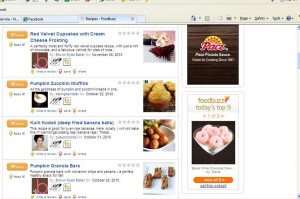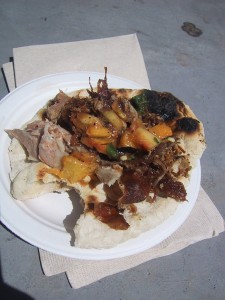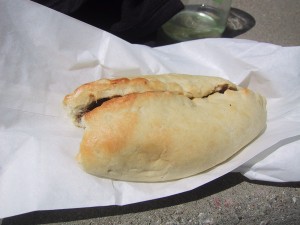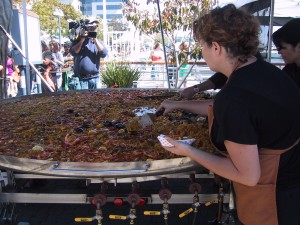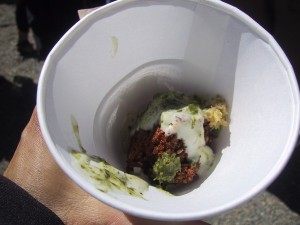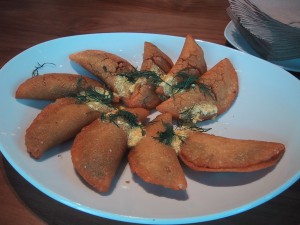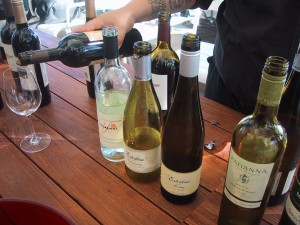As I return to the office after a long season of bidding, planning, preparing, serving and cleaning up after events, I renew my interest in blogging on a regular basis in order to connect with the food community at large. I logged back into FoodBuzz after a long hiatus, noting that my last post was something along the lines of “….too busy to even check in, much less blog and share…” dated somewhere south of last May. As I plowed through the 200+ messages from fellow “Foodies” on the site, I noticed an alarming trend. Recipe after recipe was for gooey, sweet, elaborate baked goods! Are the cookie makers, cake bakers, pie aficionados taking over the world? I searched in vain for a savory recipe, finally working my way down the list to someone’s mother’s wonton soup. Have the food bloggers of America and beyond run out of ideas for delicious foods that are not breakfast pastries, snacks or desserts? Or is something more sinister afoot? Could this be the hand of corporate America, gently guiding the thought processes of these bloggers and cooks by sponsoring bake-off’s, dessert recipe contests and the like? Is this the result of companies giving away sets of baking pans, stand mixers and convection ovens?
A friend of mine recently posted a recipe from CHOW for, of all things, a Thanksgiving Turkey Cake. The recipe calls for baking seasoned ground turkey in cake pans, which is then layered with stuffing, mashed potatoes, cranberry sauce and pureed sweet potatoes, all “frosted” with more mashed potatoes and topped with toasted baby marshmallows. The entire dish has the appearance of an oversized layer cake with a strangely matte finish. Are we Americans so jaded that we have to turn even our holiday meals into something else?
Now I am all for the elevation of food and eating above the singular status of fuel for our bodies. The joys of sharing the table with family and friends are a big part of what I teach when instructing my cooking students or clients on reclaiming their culinary heritage. I do, however, find the trend toward obesity amongst my fellow foodies disturbing. In subscribing to various food-related news sources, I am bombarded with stories about new and exciting prepared foods, chock full of unpronounceable ingredients and dubious preservatives, all wrapped up in visually appealing packaging. As I prepare to attend the annual Fancy Food Show in San Francisco this January, I continue to be overwhelmed by the increasing number of these types of foods; all are laden with empty calories, but designed to entice volume consumption.
Today’s food scene has become a microcosm of our American economy. We are harangued daily to buy and consume, buy and consume; or face the next Great Depression. Most experts agree that in order to avoid obesity and the associated health risks, we must reduced our overall caloric intake, especially the engineered fats, carbohydrates and sugars that form the foundation of these prepared foods. Yet I see very few food bloggers or celebrity chefs touting the virtues of a perfect whole roast chicken, accompanied by a few artfully prepared seasonal vegetables. Where are the simple preparations that depend solely on the quality ingredients? The other night, my husband and I shared a single small T-bone steak, seared in a cast iron skillet, topped with caramelized sweet yellow onion and served with fresh steamed Yukon gold potatoes mashed with a little bit of truffle butter. The entire dinner took less than half an hour to prepare and cost less then $10 for the two of us, yet was as flavorful and satisfying as any expensive restaurant meal. The added value was that I knew exactly what we ate; a 4-6 ounce portion of lean protein, about ½ cup each of the potatoes and one large onion. The “additives” consisted of salt and pepper to taste, a tablespoon of truffle butter (ingredients: white truffle shavings and sweet butter) and a couple of tablespoons of whole milk. The meal featured simple ingredients, simple preparations; and was a whole lot healthier than the “convenient” prepackaged alternatives.
Our food community must take a more responsible, and albeit frugal view of what we promote. A life of consuming snacks and desserts, accompanied by the latest cocktail concoctions is certainly sexier, absolutely more exciting and promotes the illusion of economic and physical health through excess. A life of balanced, thoughtful consumption is much more mundane and ordinary. I personally promote eating and cooking with all of our senses, and perhaps we should add our common sense as well. I’d love to see my fellow food advocates debate the merits of extra-virgin olive oils, or explore innovative ways to serve locally produced meats and vegetables. The food community has enormous reach, via television, the internet and print media. Imagine what we could do if we use that influence to improve the foods that our fans and readers consume every day. It is not about the next contest we can run to drive a specific number of “clicks” to our websites. It is not about how many “likes” we can collect. It is not even about attracting advertising underwriters to our blogs or selling our concepts to cookbook publishers or the Food Network. It is about being endowed with the gift of influence, communicated by the written word and by images, to impact the health and well-being of those who look to us for guidance.


